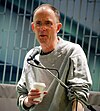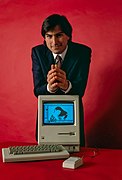The Internet PortalThe Internet (or internet) is the global system of interconnected computer networks that uses the Internet protocol suite (TCP/IP) to communicate between networks and devices. It is a network of networks that consists of private, public, academic, business, and government networks of local to global scope, linked by a broad array of electronic, wireless, and optical networking technologies. The Internet carries a vast range of information resources and services, such as the interlinked hypertext documents and applications of the World Wide Web (WWW), electronic mail, telephony, and file sharing. The origins of the Internet date back to research that enabled the time-sharing of computer resources and the development of packet switching in the 1960s. The set of rules (communication protocols) to enable internetworking on the Internet arose from research and development commissioned in the 1970s by the Defense Advanced Research Projects Agency (DARPA) of the United States Department of Defense in collaboration with universities and researchers across the United States and in the United Kingdom and France. The ARPANET initially served as a backbone for the interconnection of regional academic and military networks in the United States to enable resource sharing. The funding of the National Science Foundation Network as a new backbone in the 1980s, as well as private funding for other commercial extensions, encouraged worldwide participation in the development of new networking technologies and the merger of many networks using DARPA's Internet protocol suite. The linking of commercial networks and enterprises by the early 1990s, as well as the advent of the World Wide Web, marked the beginning of the transition to the modern Internet, and generated sustained exponential growth as generations of institutional, personal, and mobile computers were connected to the network. Although the Internet was widely used by academia in the 1980s, the subsequent commercialization in the 1990s and beyond incorporated its services and technologies into virtually every aspect of modern life. (Full article...) Selected article"Bale Out: RevoLucian's Christian Bale Remix!" is a satirical dance remix by American composer Lucian Piane, also known as RevoLucian, released on February 2, 2009, to YouTube and Myspace. The piece utilizes audio from a July 2008 rant made by actor Christian Bale on the set of Terminator Salvation. Various other elements are used in the remix, including pulsating dance track beats and clips of Barbra Streisand from a 2006 exchange with a supporter of then-President George W. Bush, creating the impression of Streisand arguing with Bale. The day after its release, the YouTube page for the song had been viewed over 200,000 times, and over a million times by February 5, 2009. The Associated Press called it a "hypnotic dance track", and United Press International noted it was "catchy", characterizing it as a "YouTube sensation". Gil Kaufman of MTV.com described the piece as "a techno-ripping, demonic dance party". Time magazine's website called the track "hilarious", and Nine News characterized it as a "raging online success". The director of Terminator Salvation McG liked the remix and put a copy of it on his iPod, and Bale said he had heard the remix and thought "they did a good job". Selected picture Wi-Fi (/ˈwaɪfaɪ/ wye-fye) is a wireless technology brand owned by the Wi-Fi Alliance intended to improve the interoperability of wireless local area network products based on the IEEE 802.11 standards. Common applications for Wi-Fi include Internet and VoIP phone access, gaming, and network connectivity for consumer electronics such as televisions, DVD players, and digital cameras. News
Wikinews Internet portal
WikiProjects
Did you know (auto-generated) -
Selected biography
William Ford Gibson, born March 17, 1948, in Conway, South Carolina is an American-Canadian writer who has been called the "noir prophet" of the cyberpunk subgenre of science fiction. Gibson coined the term cyberspace in 1982, and popularized the concept in his debut novel, Neuromancer (1984). In depicting a visualised worldwide communications network before the ubiquity of the Internet, Gibson is credited with anticipating important aspects, and establishing the conceptual foundations, of the Internet and the Web in particular. Although much of Gibson's reputation has remained rooted in Neuromancer, his work has continued to evolve conceptually and stylistically. After expanding on Neuromancer with two more novels to complete the dystopic Sprawl trilogy, Gibson became central to an entirely new science fiction subgenre—steampunk—with the publication in 1990 of the alternate history novel The Difference Engine, written in collaboration with Bruce Sterling. In the 1990s he composed the Bridge trilogy of novels, which focused on sociological observations of near future urban environments and late stage capitalism. His most recent novels—Pattern Recognition (2003), and Spook Country (2007)—are both set in a contemporary universe and have put Gibson's work onto mainstream bestseller lists for the first time.
General images -The following are images from various internet-related articles on Wikipedia.
Selected quoteMore Did you know...
Main topics
Featured contentCategoriesRelated portalsThings you can do
Associated WikimediaThe following Wikimedia Foundation sister projects provide more on this subject:
Wikipedia's portalsDiscover Wikipedia using portals |
How Can We Help?























































Recent Comments